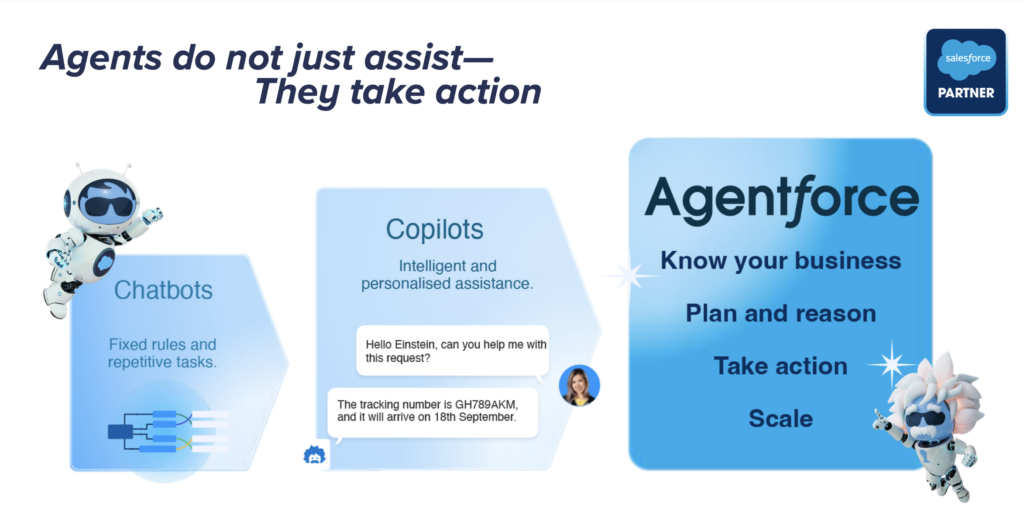Autonomous agents are transforming the customer service landscape, enabling teams to handle large volumes of enquiries, classify them intelligently, and provide immediate responses to thousands of users.
In a recent webinar, experts demonstrated how AI agents are revolutionising customer service and internal operations through a practical and scalable approach.
Agentforce On-Demand Demo
If you’d like to delve deeper into how autonomous agents are reshaping customer service and explore real-world use cases, we invite you to watch the full webinar.
This session offers valuable insights into how to implement Agentforce effectively and scale its impact across your organisation. Watch the episode here!
What are Autonomous Agents and why do they matter?
Autonomous agents are intelligent conversational systems capable of interacting with both customers and employees—not only answering frequently asked questions, but also carrying out complex tasks, from checking real-time stock to orchestrating end-to-end processes across multiple departments.
The major advantage of these agents is not just automation; it’s their deep integration with business systems (ERP, CRM, logistics, sales), allowing them to deliver precise responses and take immediate action without human intervention—except where necessary.
41% of time is wasted on repetitive, low-value tasks
Key benefits of Autonomous Agents
- Seamless, Natural User Experience: Customers experience smooth interactions with no perceived handoffs between systems or agents—even when transferred to a human.
- Time and Cost Savings: Routine and repetitive tasks are handled automatically, freeing human teams to focus on more complex issues.
- Scalability and Flexibility: From simple queries to advanced omnichannel processes, agents can grow and evolve alongside your business.
- Real-Time Information: Integration with stock, logistics, and sales systems enables accurate, data-driven responses and instant operations.
- Continuous Improvement via Monitoring: With ongoing testing and analysis, agents continuously enhance their responses and capabilities.

The path to technological maturity
When integrating AI agents, it’s advisable to adopt a staged approach—starting with basic responsibilities and ensuring reliable performance before progressively assigning more complex tasks. For instance:
- Basic: Accessing static data or knowledge bases.
- Intermediate: Integrating with internal systems to deliver dynamic responses.
- Advanced: Multichannel orchestration and full process management.
- Expert: Multiple agents working together to provide complex, personalised experiences.
This approach allows businesses to adopt the technology gradually and safely, reducing risks and maximising return on investment at each stage.
Embracing a new era in Customer Service
Autonomous agents are driving a profound transformation in customer service and business processes. Thanks to artificial intelligence and effective integration within existing tech ecosystems, organisations can boost efficiency, deliver more personalised experiences, and gain operational agility.
Adopting this technology isn’t just an innovation move—it’s a strategic necessity for staying competitive in an increasingly digital and demanding landscape.










